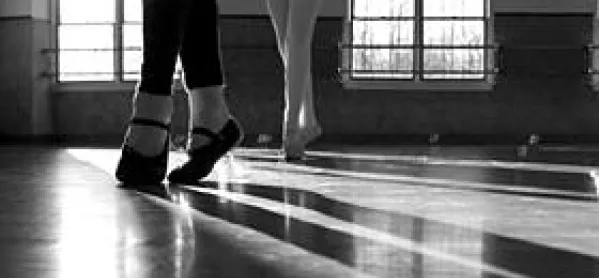A case en pointe
Free school specialising in boys’ ballet is part of a trend of applications with a non-academic focus
Share
A case en pointe
https://www.tes.com/magazine/archive/case-en-pointe

Until now, free schools have tried to attract parents by focusing on academic subjects such as Latin and classics. But less traditional timetables are now emerging in an effort to coax pupils through the gates - including the first boys’ school specialising in ballet.
Class is one of two ballet free schools in the pipeline, along with others that would focus on sport and theatre. The school, which is almost certain to be dubbed the “Billy Elliot” free school, would be based in London and would teach 11 to 16-year-old boys the full suite of English Baccalaureate subjects, alongside compulsory ballet and an option of tap, street or contemporary dance.
The application for Class is being led by Tim Stirrup, a former maths teacher, who is concerned that many boys are forced to give up dancing once they enter secondary school. Mr Stirrup, director of communications at the National Centre for Excellence in the Teaching of Mathematics, said he became aware of the problem when his son began ballet dancing.
“My middle son is a keen dancer, which got me involved in the dance world,” he said. “My son secured a place in a vocational ballet school, but many do not and end up being forced to give up dance, as it becomes a lot harder for them to train as they get older.”
Mr Stirrup said the proposal was attracting interest from parents and the dance world. He was among the first to apply for one of the new pound;5,000 grants made available to free-school applicants by Barclays Bank.
There are currently only four vocational ballet schools in the country, and they are highly selective independent schools with scholarships available only via central government grants.
According to the New Schools Network (NSN), a charity that helps groups to apply to open free schools, more and more proposals are being made for schools that will specialise in non-academic areas. “While they are in a minority in terms of applicants, there is a growing number of applicants who want to open schools that have a non-academic focus,” said Natalie Evans, NSN’s chief operating officer. “At the moment it is only a handful, but we do expect to see more as (free schools) begin to become more established.”
Ms Evans said that, in addition to Class, the charity had been contacted by a group that wanted to open a co-educational primary free school focusing on ballet.
But anti-free-school campaigners have criticised the new schools as a waste of taxpayers’ money. Fiona Millar, founder of the Local Schools Network, which promotes local state schools, said: “The government says pupils in free schools are entitled to a fair and balanced curriculum but no one has defined what that is. The worry is schools like this might pick and choose their curriculum to work around their particular specialism and the wider entitlement would be lost - a particular concern for primary- aged children.”
The Department for Education said it was happy to see a wide range of free-school applications. “We always welcome innovative proposals,” a DfE spokesperson said. “But all free schools have to offer a broad and balanced curriculum.”
Original headline: `Billy Elliot’ free school steps beyond the academic
You've reached your limit of free articles this month. Subscribe for £1 per month for three months and get: